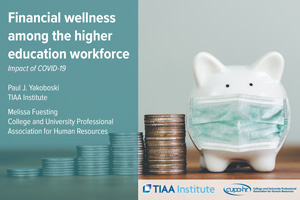New Report Highlights Importance of Financial Wellness and Literacy Among Higher Ed Workforce
 Editor’s note: Be sure to join Paul Yakoboski, senior economist at TIAA Institute, and Melissa Fuesting, survey researcher at CUPA-HR, on Wednesday, May 26 at 2:00 p.m. (ET) for the webinar, “Faculty Retirement Patterns and COVID-19: Impacts, Challenges and Opportunities.” In addition to their findings on changes to the expected retirement age for faculty, Paul and Melissa will discuss evidence-based suggestions to promote faculty retirement, such as phased retirement programs.
Editor’s note: Be sure to join Paul Yakoboski, senior economist at TIAA Institute, and Melissa Fuesting, survey researcher at CUPA-HR, on Wednesday, May 26 at 2:00 p.m. (ET) for the webinar, “Faculty Retirement Patterns and COVID-19: Impacts, Challenges and Opportunities.” In addition to their findings on changes to the expected retirement age for faculty, Paul and Melissa will discuss evidence-based suggestions to promote faculty retirement, such as phased retirement programs.
Three reports stemmed from the 2020 Higher Education Financial Wellness Survey, conducted by the TIAA Institute and CUPA-HR and fielded in the fall of 2020.
The first report examined how the economic consequences of COVID-19 have altered the expected retirement age for full-time faculty. The second report provided insights on the economic consequences of the pandemic on retirement readiness for the higher ed workforce. The final report, Financial wellness among the higher education workforce: Impact of COVID-19, examines how financial well-being among college and university employees has been impacted by COVID-19 and its economic consequences, including the topics of debt, non-retirement saving and use of financial advice.
According to the latest report, by the beginning of the Fall 2020 semester, one-third (35 percent) of college and university full-time employees has experienced a decrease in income due to furlough or salary reduction. Additionally, almost 30 percent had tapped into emergency savings because of the pandemic and its economic consequences. And 25 percent had taken on new debt, including credit card debt, because of financial hardship resulting from the pandemic.
Other key findings:
- Financial wellness has both worsened and improve among the full-time higher education workforce since the onset of COVID-19
- Over 80 percent of higher education employees carry debt (over one-half of those with debt are debt constrained)
- Over 80 percent of higher education employees are saving for a non-retirement reason
- One-third of higher education employees have received non-retirement financial advice within the past two years
- Forty percent of higher education employees expect their overall financial condition to improve during the next year
These findings highlight the importance of financial wellness programs that inform individuals’ self-evaluations regarding their financial well-being, as well as specific areas on which the individual should focus, for example, a low level of emergency savings). The findings also call attention to the importance of financial literacy — the knowledge and understanding that enable individuals to make appropriate financial decisions — which is particularly important in times of financial stress.
For more insights on COVID-19’s impact on financial wellness among the higher ed workforce, read the full report, and be sure to attend the conference session reviewing the report findings at CUPA-HR’s Virtual Spring Conference.


